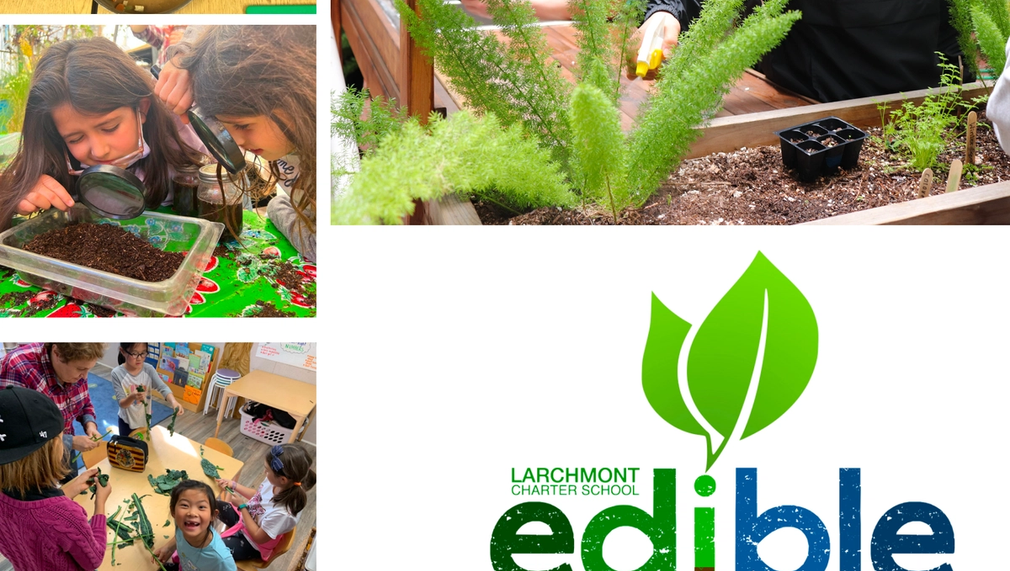Teach a Kid to Grow: Planting the Seeds of Health, Equity, and Community
Our goal is to inspire lifelong healthy habits and a passion to preserve the planet in our students. Larchmont takes a whole child, diverse by design, constructivist, inquiry-based approach to education. We wish to grow our Edible Schoolyard (ESY) curriculum to increase mastery of important eco-literacy concepts, TK-12. We propose to align our ESY programs and curriculum and plant the seeds of awareness and activism to give all students the hands-on wonder and scientific understanding of nourishing a garden to grow and changing the world.

What is the primary issue area that your application will impact?
K-12 STEAM Education
In which areas of Los Angeles will you be directly working?
Central LA
In what stage of innovation is this project, program, or initiative?
Expand existing project, program, or initiative
What is your understanding of the issue that you are seeking to address?
What if there were a way to bridge the divide in our communities and build a more equitable LA–one where we experience the connections between the environment, science, community, and culture equally. While the solution we propose may seem small, this elegant program has transformative potential. As a diverse by design school, our classrooms are a microcosm of the city itself. By nurturing a love of healthy food and stewardship of the environment, we’re helping to balance the inequities that affect low-income communities of color disproportionally. We strive to align the ESY experience an elementary student may have while learning about a seed's life cycle to the connection a high school student may have when learning about biodiversity, photosynthesis, and composting. Funds from LA2050 will be used to ensure all Larchmont students - regardless of age and financial means - experience an education that provides hands-on experiences connecting students to food, nature, and each other.
Describe the project, program, or initiative this grant will support to address the issue.
The mission of Larchmont Charter School is to provide a socio-economically, culturally and racially diverse community of students with an exceptional public education. In our Edible Schoolyard Program, students experience garden and kitchen lessons that integrate ecological concepts with real-life applications. Driven by the California State Standards, our garden and kitchen projects connect learning in the areas of Language Arts, Mathematics, Social Studies, Science, and Physical Education. At Larchmont Charter School, the Edible Schoolyard (ESY) is an invaluable tool in helping us to achieve our mission of providing an exceptional public education to a diverse community through a project-based, constructivist approach to teaching and learning. While our current program is strong, we haven’t had the resources to build the capacity to broaden it for the most impact. Funds from 2050 will allow ESY teachers to meet, plan, align and grow the curriculum to make certain the experience is robust from K-12th grade. Increased time to plan as a team, increased materials for students to use in the garden, more plants, and trees to watch and learn from, and more time to use fruits and vegetables from the garden in the school kitchens will increase consciousness of the benefits of eating locally grown, organic food, furthering awareness of food choices and their impact on the planet as a whole.
Describe how Los Angeles County will be different if your work is successful.
An ESY education provides hands-on experiences that connect students to food, nature, and each other; and it systematically addresses the crises of climate change, public health, and social inequality. In addition to improved air and soil quality, the increased numbers of organic materials will provide sources of food and even shelter to local wildlife, including insects, pollinators, and birds - a benefit to our city’s health. Our scratch kitchen sources food from local farmers for our school lunches, a group even more important to support since the pandemic. Awareness, passion, and a mutual understanding of each other instilled in our children at all ages will be brought home and shared with family and friends, paying dividends outside our school’s walls and into the city.
What evidence do you have that this project, program, or initiative is or will be successful, and how will you define and measure success?
The impact of our project-based learning and ESY Programs curriculum is measured by surveying our students and families twice a year, student observation and feedback, anecdotal data, and California Fitness Gram results. We also look at our meal participation rates to see how participation increases when scratch food is served at a campus that currently does not serve scratch-cooked food every day. The rate jumps to more than two to three times the average. Students from TK-12th grade regularly create clubs and focus their Signature/Capstone Projects to address various ecological and environmental issues facing their campuses - a clear indication of the ESY programs’ impact.
Approximately how many people will be impacted by this project, program, or initiative?
Direct Impact: 1,600
Indirect Impact: 3,000